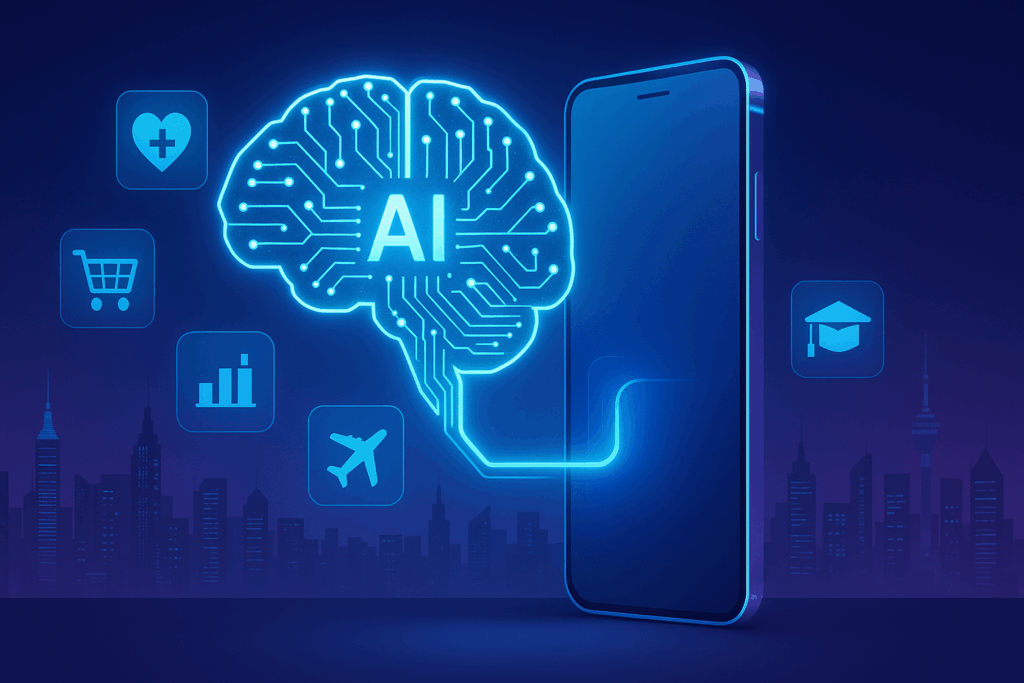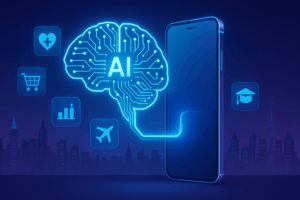In the past decade, mobile apps have become the lifeline of businesses—whether it’s a startup trying to scale quickly or an enterprise aiming to enhance customer experience. But as users demand smarter, faster, and more personalized apps, traditional development methods fall short.
That’s where AI in mobile app development steps in. In 2025, AI is no longer a buzzword—it’s the engine driving the future of mobile app development 2025. From automated coding to intelligent personalization and predictive analytics, AI is revolutionizing the way businesses design, build, and monetize apps.
If you’re planning to invest in mobile app development this year, understanding the role of AI-powered mobile apps is crucial. Let’s explore how AI is redefining the app ecosystem in 2025.
AI-Powered Development: Faster, Smarter, and Cost-Effective
Traditionally, building an app meant long development cycles, manual testing, and high costs. AI is transforming this process in multiple ways.
- AI-assisted coding: Tools like GitHub Copilot help developers write code faster and with fewer errors.
- Automated testing: AI detects bugs in real-time, predicts potential failures, and reduces QA time by up to 40 percent.
- Low-code platforms with AI: Businesses can now launch prototypes quickly, even with smaller teams.
This means apps are reaching the market 40–60 percent faster, giving companies a competitive edge. For businesses seeking custom mobile app development with AI, this acceleration also reduces costs.
Hyper-Personalization: Smarter User Journeys
Modern users expect apps that understand them. AI enables this by analyzing vast amounts of user data to deliver personalized experiences.
- Recommendation engines: Similar to Netflix and Amazon, AI-powered apps suggest content, products, or services tailored to each user.
- Predictive search: AI can suggest queries or results before users even type.
- Dynamic UI/UX: Interfaces adapt to user behavior, location, and preferences.
Businesses that integrate AI personalization in mobile apps are seeing retention rates improve by 20–30 percent and customer lifetime value grow significantly.
Conversational AI and Voice-Enabled Apps
2025 is shaping up as the year of conversational interfaces. With more people relying on Siri, Alexa, and Google Assistant, voice-enabled apps are no longer optional.
- Chatbots and Virtual Assistants: AI-powered bots offer 24/7 instant support.
- Voice commands: Users can shop, book, or search hands-free.
- Multilingual capabilities: AI enables global reach by breaking language barriers.
Research suggests that over 8.4 billion voice assistants will be in use by the end of 2025. For businesses, building AI voice-enabled apps is now an essential strategy for user engagement.
Security Reinvented with AI
With growing concerns about cybersecurity, AI is helping businesses secure apps like never before.
- Fraud detection: AI monitors unusual login or transaction patterns.
- Biometric security: Face recognition, fingerprint scans, and voice authentication powered by AI.
- Predictive threat analysis: AI systems stop malware or leaks before they happen.
For industries like fintech, healthcare, and eCommerce, AI in app testing and security is non-negotiable.
Smarter App Monetization with AI
AI isn’t just enhancing development—it’s redefining how apps generate revenue.
- Dynamic pricing models: E-commerce apps adjust prices in real-time based on demand and behavior.
- AI-powered advertising: Smarter ad placements drive higher ROI.
- Churn prediction models: AI identifies when users may cancel subscriptions and provides targeted retention offers.
Businesses adopting AI app development trends 2025 in monetization see 15–25 percent higher revenue growth compared to traditional models.
Industry Use Cases: AI in Action
AI in mobile apps is reshaping entire industries:
- Healthcare Apps: AI assists in telemedicine, diagnostics, and patient monitoring.
- Retail and E-commerce Apps: Personalized shopping journeys powered by AI recommendations.
- Finance Apps: Fraud detection, robo-advisors, and credit scoring.
- Education Apps: Adaptive learning platforms customize lessons for students.
- Travel and Hospitality Apps: AI chatbots manage bookings and provide personalized trip suggestions.
Whether it is AI in eCommerce and retail mobile apps or AI in healthcare mobile apps, businesses are adopting solutions that deliver measurable value.
The Future of AI in Mobile App Development Beyond 2025
AI is just getting started. The coming years will bring innovations such as:
- AR/VR combined with AI for immersive mobile experiences.
- Edge AI for faster processing directly on devices, reducing dependency on servers.
- IoT-powered apps for smarter homes, connected cars, and wearables.
- Generative AI in apps for content creation, design, and voice synthesis.
By 2026, Gartner predicts that more than 70 percent of enterprise mobile apps will use AI-driven features, making AI app development trends 2025 a defining factor for long-term success.
Challenges of AI in Mobile Apps
While promising, AI-powered app development comes with challenges businesses must address.
- Data privacy concerns with user data collection.
- Integration costs for advanced AI models.
- Skill gaps among developers for cutting-edge AI tools.
The key lies in partnering with experienced providers of mobile app development services USA who have proven expertise in AI adoption.
Conclusion
AI is no longer an experimental add-on—it is the backbone of modern mobile apps. From speeding up development to delivering personalized user experiences and strengthening security, AI is transforming apps into intelligent business tools.
Businesses that adopt AI-powered mobile apps in 2025 will enjoy higher engagement, faster growth, and long-term competitive advantages. If you are planning to build or upgrade your mobile app, now is the time to embrace AI-first solutions.
Call to Action
At PQube Business Solutions, we specialize in creating AI-powered mobile app development solutions that help businesses stay ahead of the curve.
Explore our Mobile App Development Services
Frequently Asked Questions
Q1. What are AI-powered mobile apps?
AI-powered apps use technologies like machine learning, natural language processing, and predictive analytics to deliver smarter, more personalized experiences.
Q2. How does AI help in mobile app development?
AI accelerates coding, improves app testing, strengthens security, and personalizes user journeys.
Q3. What is the cost of building an AI-powered app in 2025?
The cost of AI-powered mobile apps in 2025 depends on features and complexity, but AI-assisted builds are typically 30–40 percent more cost-efficient than traditional apps.
Q4. Which industries benefit most from AI-driven apps?
Healthcare, finance, retail, education, and travel are leading sectors adopting AI-powered mobile apps.
Q5. What is the future of AI in mobile app development?
The future includes generative AI in apps, AR/VR integration, IoT-powered apps, and edge AI for real-time performance.







